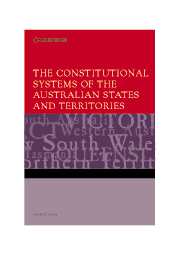Book contents
- Frontmatter
- Contents
- Table of cases
- Table of statutes
- Preface
- List of abbreviations
- Map
- 1 Introduction
- 2 Constitutional evolution of the States
- 3 The Legislature
- 4 Legislative power
- 5 Repugnancy
- 6 Manner and form
- 7 Extraterritoriality
- 8 Executive power
- 9 Republic
- 10 Judicial protection
- 11 Commonwealth territories power
- 12 Commonwealth territories
- Appendix 1 Constitutional Conventions adopted by Resolution of the Australian Constitutional Convention, Brisbane 29 July – 1 August 1985
- Appendix 2 Northern Territory (Self-Government) Regulations 1978 (Cth) – Reg 4
- Appendix 3 Australian Capital Territory (Self-Government) Act 1988 – Schedule 4
- Appendix 4 Ten Lessons from the Crisis over the Governor-General, Dr Peter Hollingworth (May 2003)
- Index
Appendix 4 - Ten Lessons from the Crisis over the Governor-General, Dr Peter Hollingworth (May 2003)
Published online by Cambridge University Press: 16 November 2009
- Frontmatter
- Contents
- Table of cases
- Table of statutes
- Preface
- List of abbreviations
- Map
- 1 Introduction
- 2 Constitutional evolution of the States
- 3 The Legislature
- 4 Legislative power
- 5 Repugnancy
- 6 Manner and form
- 7 Extraterritoriality
- 8 Executive power
- 9 Republic
- 10 Judicial protection
- 11 Commonwealth territories power
- 12 Commonwealth territories
- Appendix 1 Constitutional Conventions adopted by Resolution of the Australian Constitutional Convention, Brisbane 29 July – 1 August 1985
- Appendix 2 Northern Territory (Self-Government) Regulations 1978 (Cth) – Reg 4
- Appendix 3 Australian Capital Territory (Self-Government) Act 1988 – Schedule 4
- Appendix 4 Ten Lessons from the Crisis over the Governor-General, Dr Peter Hollingworth (May 2003)
- Index
Summary
The background of the appointee should be thoroughly checked, following a public process of consultation. It should be a bipartisan appointment.
A religious leader should not be appointed to avoid the perception of a church–State relationship which the Constitution expressly forbids in s 116.
An appointment as Governor-General should not be accepted if this is likely to arouse personal attacks against the appointee.
If personal attacks are made, a written response may be required from the Governor-General. If necessary, an independent arbiter should be appointed to assess any serious allegations. This function could be performed by a Council of constitutional advisors (see paragraph 8 below). This reduces the opportunity for trial by media.
Past conduct is relevant to maintaining public confidence in the office. It will usually be judged on the basis of contemporary standards.
The Government and the Opposition parties must realise that as soon as either side of politics withdraws support for the Governor-General, the incumbent's resignation is inevitable. The capacity to perform the functions of the office impartially and in a politically neutral way is fatally undermined by such a loss of confidence.
Before the Government or the Opposition withdraws their support, they must be satisfied that there are verified grounds which render the incumbent unfit for the office of Governor-General. Such a position is reached when there is such a loss in public confidence that the Governor-General is reasonably seen to be unable to perform the ceremonial and constitutional duties of the office.
Verification of allegations ought to be undertaken by a small Council of independent constitutional advisors. Such a Council should be permanently in place to advise the Governor-General; its members appointed jointly by the Prime Minister and the Leader of the Opposition.
[…]
- Type
- Chapter
- Information
- Publisher: Cambridge University PressPrint publication year: 2006



